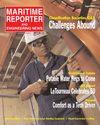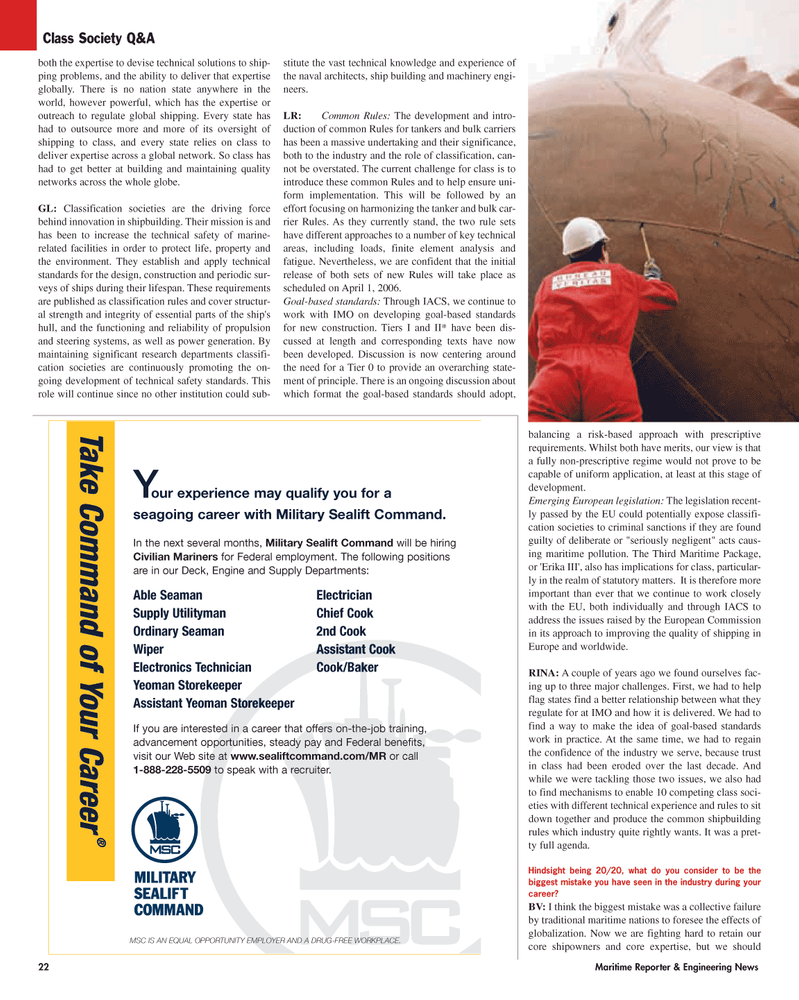
Page 22: of Maritime Reporter Magazine (August 2005)
AWO Edition: Inland & Offshore Waterways
Read this page in Pdf, Flash or Html5 edition of August 2005 Maritime Reporter Magazine
both the expertise to devise technical solutions to ship- ping problems, and the ability to deliver that expertise globally. There is no nation state anywhere in the world, however powerful, which has the expertise or outreach to regulate global shipping. Every state has had to outsource more and more of its oversight of shipping to class, and every state relies on class to deliver expertise across a global network. So class has had to get better at building and maintaining quality networks across the whole globe.
GL: Classification societies are the driving force behind innovation in shipbuilding. Their mission is and has been to increase the technical safety of marine- related facilities in order to protect life, property and the environment. They establish and apply technical standards for the design, construction and periodic sur- veys of ships during their lifespan. These requirements are published as classification rules and cover structur- al strength and integrity of essential parts of the ship's hull, and the functioning and reliability of propulsion and steering systems, as well as power generation. By maintaining significant research departments classifi- cation societies are continuously promoting the on- going development of technical safety standards. This role will continue since no other institution could sub- stitute the vast technical knowledge and experience of the naval architects, ship building and machinery engi- neers.
LR: Common Rules: The development and intro- duction of common Rules for tankers and bulk carriers has been a massive undertaking and their significance, both to the industry and the role of classification, can- not be overstated. The current challenge for class is to introduce these common Rules and to help ensure uni- form implementation. This will be followed by an effort focusing on harmonizing the tanker and bulk car- rier Rules. As they currently stand, the two rule sets have different approaches to a number of key technical areas, including loads, finite element analysis and fatigue. Nevertheless, we are confident that the initial release of both sets of new Rules will take place as scheduled on April 1, 2006.
Goal-based standards: Through IACS, we continue to work with IMO on developing goal-based standards for new construction. Tiers I and II* have been dis- cussed at length and corresponding texts have now been developed. Discussion is now centering around the need for a Tier 0 to provide an overarching state- ment of principle. There is an ongoing discussion about which format the goal-based standards should adopt, balancing a risk-based approach with prescriptive requirements. Whilst both have merits, our view is that a fully non-prescriptive regime would not prove to be capable of uniform application, at least at this stage of development.
Emerging European legislation: The legislation recent- ly passed by the EU could potentially expose classifi- cation societies to criminal sanctions if they are found guilty of deliberate or "seriously negligent" acts caus- ing maritime pollution. The Third Maritime Package, or 'Erika III', also has implications for class, particular- ly in the realm of statutory matters. It is therefore more important than ever that we continue to work closely with the EU, both individually and through IACS to address the issues raised by the European Commission in its approach to improving the quality of shipping in
Europe and worldwide.
RINA: A couple of years ago we found ourselves fac- ing up to three major challenges. First, we had to help flag states find a better relationship between what they regulate for at IMO and how it is delivered. We had to find a way to make the idea of goal-based standards work in practice. At the same time, we had to regain the confidence of the industry we serve, because trust in class had been eroded over the last decade. And while we were tackling those two issues, we also had to find mechanisms to enable 10 competing class soci- eties with different technical experience and rules to sit down together and produce the common shipbuilding rules which industry quite rightly wants. It was a pret- ty full agenda.
Hindsight being 20/20, what do you consider to be the biggest mistake you have seen in the industry during your career?
BV: I think the biggest mistake was a collective failure by traditional maritime nations to foresee the effects of globalization. Now we are fighting hard to retain our core shipowners and core expertise, but we should 22 Maritime Reporter & Engineering News
MSC IS AN EQUAL OPPORTUNITY EMPLOYER AND A DRUG-FREE WORKPLACE.
T ak e
Command of Y our Car eer ®
Your experience may qualify you for a seagoing career with Military Sealift Command.
In the next several months, Military Sealift Command will be hiring
Civilian Mariners for Federal employment. The following positions are in our Deck, Engine and Supply Departments:
Able Seaman Electrician
Supply Utilityman Chief Cook
Ordinary Seaman 2nd Cook
Wiper Assistant Cook
Electronics Technician Cook/Baker
Yeoman Storekeeper
Assistant Yeoman Storekeeper
If you are interested in a career that offers on-the-job training, advancement opportunities, steady pay and Federal benefits, visit our Web site at www.sealiftcommand.com/MR or call 1-888-228-5509 to speak with a recruiter.
Class Society Q&A
MR AUGUST 2005 #3 (17-24).qxd 8/4/2005 5:49 PM Page 22

 21
21

 23
23
